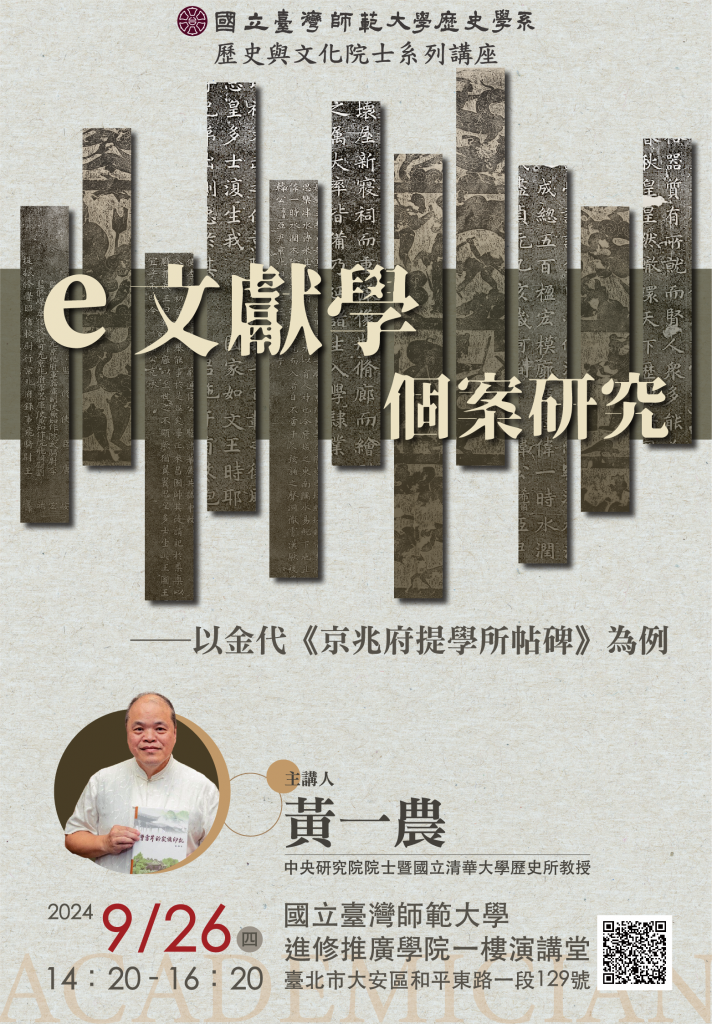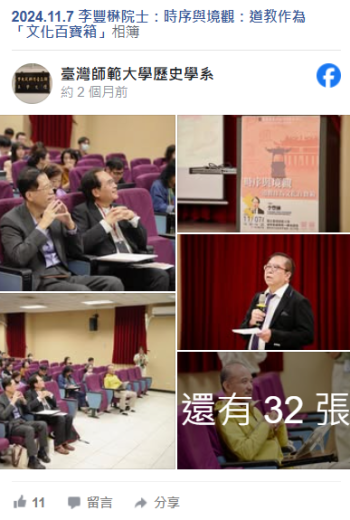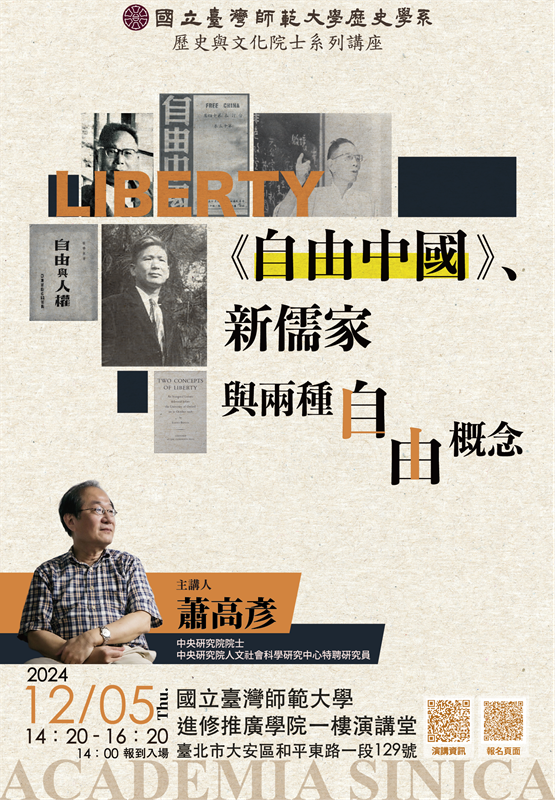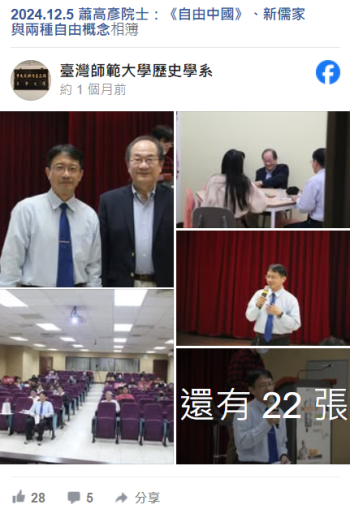ACADEMIA SINICA
2024.9.26 Huang, Yi-Long
Writer:Jerry Wang
E-Philology: Analyzing the “Jingzhao County School and Residence Filing” (京兆府學贍學舍地清冊) as a Case Study
In today’s rapidly advancing technological landscape, research methodologies across various fields have been profoundly transformed. In finance, for instance, artificial intelligence is integrated with financial analysis to solve complex company challenges. Similarly, historians must adopt new technologies to enhance their research and remain relevant in the digital age. To address this shift, Professor Yi-Long Huang introduced the concept of E-Philology, blending digital tools with traditional historical research methods.
Professor Huang, who earned his PhD in Anatomy from Columbia University, developed a deep interest in the history of technology after completing his studies. His growing curiosity led him to incorporate databases and big data analytics into historical research, resulting in the pioneering field of E-Philology. This approach leverages digital resources to complement traditional scholarship, broadening the scope and depth of historical inquiry.
E-Philology combines big data with conventional historical methods, enabling scholars to process and analyze vast amounts of information more efficiently than ever before. Traditional research methods that rely on paper archives are often time-consuming and limited in scale. By utilizing databases and advanced analytical tools, historians can access and interpret a wealth of data with increased accuracy and speed. In one of his significant studies, Professor Huang applied E-Philology to the Qing Dynasty’s taboo characters, focusing on those banned by imperial decree. Through the use of a comprehensive database, he uncovered that the character 「胤 (yin)」 had been classified as taboo before the Yongzheng era—a discovery that reshaped the understanding of Qing Dynasty naming taboos.
However, Professor Huang also emphasizes the importance of caution when relying on digital tools. While E-Philology enables researchers to analyze data more efficiently, the accuracy and authenticity of the data must be thoroughly verified. During his study of the Jingzhao County School and Residence Filing (京兆府學贍學舍地清冊), he uncovered multiple errors and instances of data tampering, highlighting the continued necessity of primary source verification. This case underscores that while digital tools can greatly enhance historical research, scholars must remain vigilant about the reliability of their sources.
In conclusion, E-Philology represents a significant advancement in historical research, allowing for more efficient evidence discovery and deeper analysis. Nonetheless, the critical practice of cross-referencing digital findings with original primary sources remains essential. Professor Huang advocates for history students and researchers to embrace these technological innovations, as they are poised to shape the future of historical scholarship.
The lecture on E-Philology, which featured over 100 scholars and students, was met with enthusiasm and agreement. Many participants expressed their belief in the practicality of E-Philology for their future research endeavors, making the event a resounding success.

2024.10.24 Yang, Rur-Bin
Writer:Jerry Wang
A Theory of Fudo and Oceanic Confucianism: Reflections on Taiwan’s Contemporary Situation
The ongoing tension between China and Taiwan remains a pressing issue, yet much of the scholarly focus tends to center on its outcomes rather than its root causes. Professor Rur-Bin Yang, a leading intellectual historian with a Ph.D. from National Taiwan University, takes a different approach. Drawing on historical context and the Fudo theory of Watsuji Tetsuro, Professor Yang offers a nuanced analysis of the tensions, bringing fresh insights into Taiwan’s distinct historical trajectory.
Taiwan Island History and the Theory of Fudo
The foundational concept of Taiwan Island history, as developed by Yung-Ho Tsao, provides a critical framework for understanding Taiwan’s unique historical development. Unlike China’s relatively continuous and unified historical narrative, Taiwan’s history is characterized by fragmentation and diversity. Tsao’s theory suggests that scholars should analyze Taiwan’s past from the perspectives of its people and the geographical and cultural context of the island itself, rather than focusing exclusively on political events. This localized approach offers a richer understanding of Taiwan’s evolving social and political authority, shedding light on the complexities of its contemporary identity.
Complementing this is the theory of Fudo, which merges Hegelian dialectics with localized environmental and cultural perspectives. This theory explores how climate and geography shape human activity, culture, and national identity. By integrating Taiwan Island history with the theory of Fudo, scholars can uncover deeper connections between Taiwan’s environment, historical development, and its modern sociopolitical landscape. Together, these theories form a robust foundation for understanding Taiwan’s history as a distinct and evolving narrative.
Oceanic Confucianism: A Unique Philosophical Tradition
Adding to these frameworks, Professor Yang introduces the concept of Oceanic Confucianism, a branch of Confucian thought that evolved outside mainland China, particularly in Taiwan. First articulated by Nianfeng Chiang, Oceanic Confucianism traces its roots to democratic ideas that emerged during the late Ming Dynasty. These ideas continued to develop and were further refined in Taiwan’s unique cultural and intellectual context.
Oceanic Confucianism reflects Taiwan’s maritime culture and its openness to external influences, distinguishing it from traditional Confucianism rooted in the agrarian traditions of mainland China. Over time, it has become a defining element of Taiwan’s intellectual history, embodying values such as pluralism, adaptability, and democratic thought. Professor Yang argues that Oceanic Confucianism not only complements Taiwan Island history and the theory of clime but also serves as a philosophical lens for understanding Taiwan’s modern identity. It underscores the island’s capacity to synthesize diverse influences while maintaining a distinct cultural identity.
Toward a Nuanced Understanding of Taiwan’s Historical and Intellectual Identity
Professor Yang’s work demonstrates that a special intellectual interpretation built upon the interplay of Taiwan Island history, the theory of Fudo, and Oceanic Confucianism. These frameworks highlight Taiwan’s distinctiveness from China and other parts of the world, offering a comprehensive approach to analyzing its current situation. Yang’s perspective challenges the tendency to view Taiwan solely through the lens of political events, advocating instead for a broader and more integrative understanding. By analyzing Taiwan’s history through these theories, Professor Yang emphasizes the importance of contextualizing Taiwan’s present tensions within its unique historical and cultural development.
Conclusion: A Framework for Resolution and Reconciliation
Professor Yang’s integrative approach offers valuable tools for addressing the ongoing China-Taiwan crisis. By situating the conflict within Taiwan’s unique historical and intellectual frameworks, he encourages a shift away from viewing the situation as merely a geopolitical issue. Instead, he advocates for understanding it as the culmination of Taiwan’s historical, environmental, and philosophical evolution.
This perspective not only enriches the academic study of Taiwan but also provides a pathway for fostering dialogue and reconciliation. As scholars and policymakers alike continue to grapple with the complexities of the China-Taiwan relationship, Professor Yang’s work stands as a vital contribution, reminding us of the importance of understanding history, geography, and philosophy as interconnected forces shaping the present and future. His lecture organized by the History Department at NTNU drew over 100 scholars and students and sparked significant interest in applying these theories to future research on Taiwan’s history. Participants lauded his ability to merge theoretical rigor with practical relevance, making his work an important contribution for studies on Taiwan’s intellectual and political identity.
-800.png)
2024.11.07 Lee, Fong-Mao
Writer:Jerry Wang
Times and Environment: Taoism as a Cultural Treasure Box
In many classical historical works, Taoism is often portrayed as a vital link between people’s daily lives and their religious beliefs. In sociology, such connections are frequently described using the metaphor of a “cultural treasure box,” symbolizing a repository of cultural elements that people can draw upon and recombine in diverse ways. Professor Lee Fong-Mao argues that Taoism has served as a significant cultural treasure box in traditional Chinese society throughout various historical periods.
Professor Lee Fong-Mao is an academician at Academia Sinica. He earned his bachelor’s degree from the Department of Chinese Literature at National Taiwan Normal University, his master’s degree and PhD from National Chengchi University. His research focuses on Taoist literature and ceremonies. Utilizing diverse research methods, including literary analysis and fieldwork, he explores the interplay between the ordinary and the extraordinary. Within this framework, he highlights a complementary relationship between the traditional Yin-Yang theory and Chinese thought, which underpins his concept of the cultural treasure box.
To elaborate on the idea of the cultural treasure box, Professor Lee begins by defining Taoism. During the late Qing Dynasty, Taoism faced criticism from scholars like Chen Duxiu, who dismissed it as superstitious and ineffective in addressing governance or social issues. However, after the 1930s, scholars and thinkers began to adopt new perspectives on Taoism’s cultural significance. Against this backdrop, Professor Lee developed the concept of the cultural treasure box. He argues that Taoism is deeply integrated into the daily lives of Chinese people and can be analyzed through historical methodologies, representing a valuable cultural heritage for all Chinese communities.
To illustrate the concept of the cultural treasure box, Professor Lee employs the four seasons as a metaphor for four key themes: solar terms, gratitude to the earth, integration with Taoist philosophy, and reflections on life and death. These themes are deeply rooted in Chinese traditions and represent intrinsic doctrines unaffected by external rituals or environments. For instance, Sanyuan Day, a solar term adopted by Taoism, symbolizes the acknowledgment of human guilt, with divine judgment determining an individual’s afterlife. According to Taoist historical texts, this observance encourages self-reflection and prayers for absolution. Professor Lee suggests that this cycle of self-examination complements Chinese moral principles and embodies the unique characteristics of Chinese culture.
In conclusion, Professor Lee asserts that Taoism has integrated diverse elements throughout its historical evolution. As one of the foundational pillars of traditional Chinese religion, Taoism occupies a vital position, complementing both Buddhism and Confucianism. Its deep-rooted connection to Chinese traditions establishes it as a cultural treasure box. Professor Lee believes that Taoism will continue to play a significant role in the future, resisting replacement by scientific culture due to its enduring importance within Chinese heritage.
2024.12.05 Carl K. Y. Shaw
Writer:Jerry Wang
Free China Journal: New Confucianism and Two Concepts of Liberty
In the modern world, liberty forms the cornerstone of human rights and remains a central theme in contemporary philosophy. The evolution of the concept of liberty continues to fascinate philosophers and scholars. Professor Carl Shaw, a distinguished academician from Academia Sinica, has shared his insights on liberty and its conceptual development. He argues that the understanding of liberty in Taiwan presents diverse characteristics that cannot be fully captured by the traditional dichotomy of liberty into two distinct concepts.
Professor Shaw holds both a bachelor’s and a master’s degree in political science from National Chengchi University, and he earned his doctoral degree in political science from Yale University. His expertise lies in the history of political thought and political philosophy, and he has published numerous influential books that have contributed significantly to the field. Liberty has been one of his early research interests, and he emphasizes that his methodological approach holds value for various historical inquiries.
At the outset of his presentation, Professor Shaw discussed Isaiah Berlin’s two concepts of liberty: positive and negative liberty. He noted that the definition of these concepts has evolved over time, with each historical period shaping their meaning. Therefore, he stressed the importance of contextualizing these ideas within their respective eras to ensure accurate analyses. Just as with other historical research, scholars must consider the unpredictable nature of history to avoid misinterpretations and anachronisms.
Building on these definitions of liberty, Professor Shaw examined the development of liberalism in Taiwan after 1949. Hu Shi introduced a series of ideas and writings on liberalism, marking its symbolic inception in Taiwan. However, these ideas were primarily political in nature, rather than serving as comprehensive theoretical frameworks.
Two other scholars who significantly influenced the development of liberalism in Taiwan were Yin Hai-kuang and Chang Fo-Chuan. Yin Hai-kuang, influenced by Hu Shi and British economist Friedrich Hayek, emphasized the protection of individual rights as central to liberalism. However, after experiencing job loss and restrictions on his freedom to publish, his views evolved toward a focus on positive liberty. Professor Shaw suggested that these shifts reflect the evolving nature of individual understanding, often shaped by the contingencies of history.
In contrast, Chang Fo-Chuan leaned toward a preference for negative liberty, while integrating elements of positive liberty. His perspective sometimes conflicted with New Confucianism. For instance, New Confucian scholars like Mou Tsung-san emphasized moral freedom over political liberty, arguing that liberty must encompass moral dimensions. Professor Shaw noted that while Chang’s viewpoint inherently included moral considerations, New Confucian scholars failed to recognize this, leading to what he termed a “conversation without a beginning.”
In conclusion, Professor Shaw underscored the dynamic nature of ideological change. Personal beliefs are often shaped by social environments and individual experiences. He urged researchers to observe carefully the trends in historical development. To analyze the evolution of liberalism in the 1950s, Professor Shaw recommended employing genealogical methods to challenge biases between liberalism and New Confucianism, especially with regard to their respective understanding of liberty and freedom.
-800.png)


